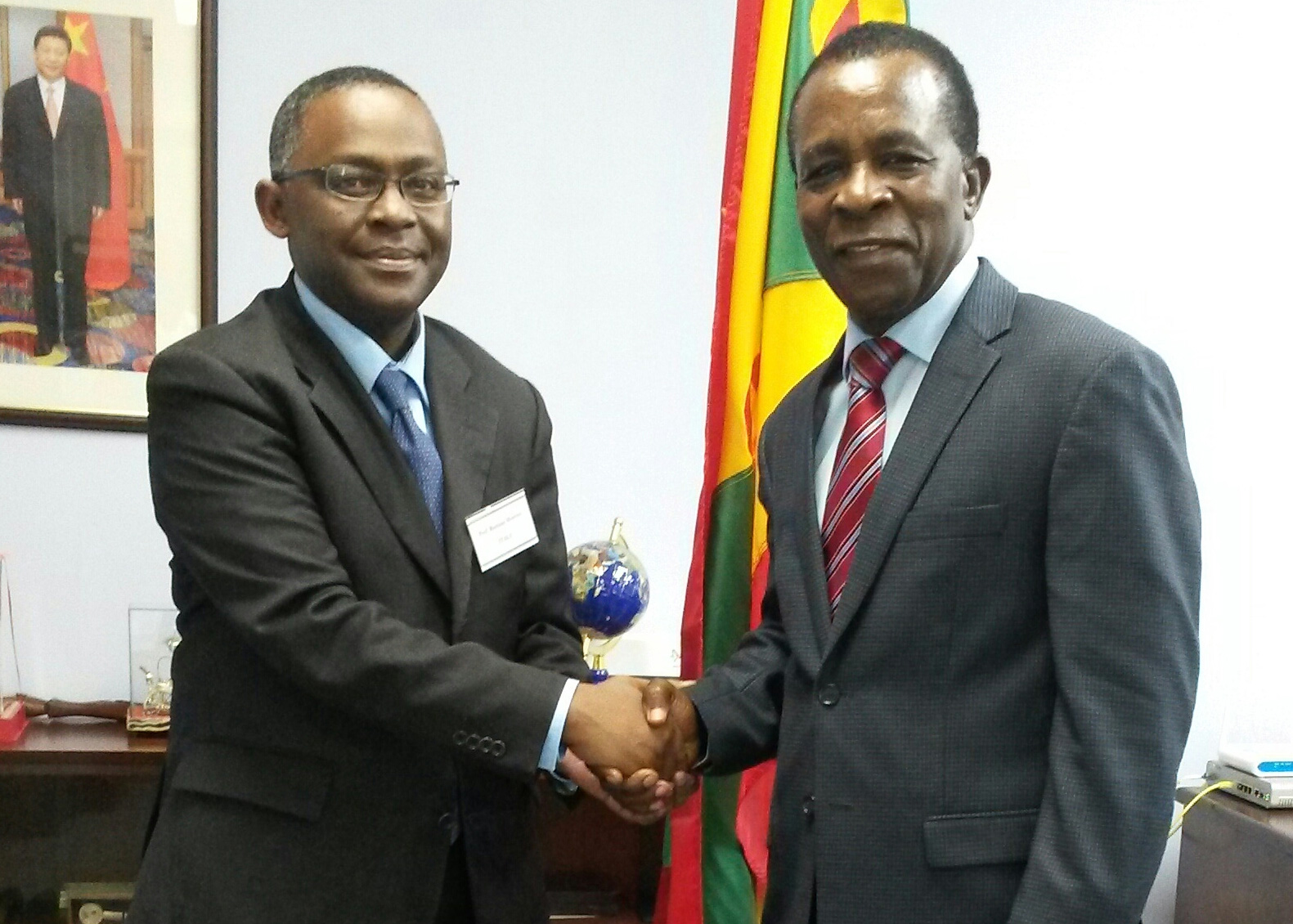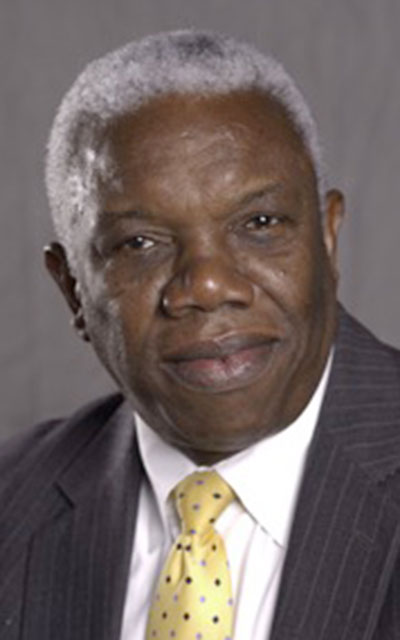Despite chronic poverty and public debt, Caribbean nations must find a way to increase investments in research and development and science education, top science and policy leaders said at high-level conference in Grand Anse, Grenada.
Led by Grenada Prime Minister Keith Mitchell and joined by TWAS Council member Harold Ramkissoon and TWAS Executive Director Romain Murenzi, speakers at the conference urged nations of the Caribbean Community to summon the political will needed to make the new investments. Without that focused energy, they suggested, the nations will struggle to address economic growth and science-related challenges such as climate change and disaster preparation and will continue to suffer from debilitating brain drain.
 “We here in the Caribbean therefore have no choice…but to further promote the development of science and technology and do so aggressively and with urgency, so that it can assist with the socio-economic development of our people,” said Mitchell, a PhD-level mathematician, in the keynote address.
“We here in the Caribbean therefore have no choice…but to further promote the development of science and technology and do so aggressively and with urgency, so that it can assist with the socio-economic development of our people,” said Mitchell, a PhD-level mathematician, in the keynote address.
“Inadequate expenditure on R&D has been for too long our greatest obstacle to development in the region, and we must now make investment in R&D a top priority,” Mitchell added. “We have no choice, if we are going to ensure a secure future.”
Mitchell is the prime minister in charge of science and technology for CARICOM, an organization of 15 Caribbean nations and dependencies that was founded in 1973. His remarks came during the 2nd High-Level CARICOM S&T Meeting, “Strengthening and Utilizing S&T in the Caribbean”, that ran from 26-28 March in Grand Anse, Grenada. The conference was organized by the CARICOM Science, Technology and Innovation Committee and CARISCIENCE, UNESCO, and the TWAS Regional Office for Latin America and the Caribbean (ROLAC).
The meeting was attended by science and education ministers and other top-level government officials from Antigua and Barbuda; the Bahamas; Barbados; the British Virgin Islands; Dominica; Grenada; Jamaica; Montserrat; St. Lucia; Trinidad and Tobago. It also featured representatives of the private sector and the Caribbean diaspora.
The conference culminated in the endorsement of a Grand Anse Declaration, which called on the Caribbean nations to make a stronger, more coordinated commitment economic development through science, technology and innovation.
TWAS had a high-profile presence at the conference. In addition to Murenzi and Ramkissoon, speakers included TWAS Fellow Anthony K. Cheetham, vice-president and treasurer of the Royal Society, and Carlos Alberto Aragão de Carvalho Filho, former ROLAC chairman.
![TWAS Council member Harold Ramkissoon [file photo]](/sites/default/files/inline-images/ramkissoon_harold_slideshow_400x640.jpg) Ramkissoon, who serves as the head of the CARICOM S&T committee, was the chief organizer. He was an independent senator in the Trinidad and Tobago Parliament and also serves on the board of UNESCO’s International Centre for South-South Cooperation; he is a professor emeritus of mathematics at the University of the West Indies.
Ramkissoon, who serves as the head of the CARICOM S&T committee, was the chief organizer. He was an independent senator in the Trinidad and Tobago Parliament and also serves on the board of UNESCO’s International Centre for South-South Cooperation; he is a professor emeritus of mathematics at the University of the West Indies.
In an email interview after the event, Ramkissoon joined Mitchell and others in urging a new commitment to science, engineering and innovation in the Caribbean. The current “lack of political will” is evident in low rates of R&D investment, he said. No country in the region spends more than 0.2% of its gross domestic product on R&D, he explained, and “the weak economies of most countries have kept R&D on their backburner.”
He saw two key points emerging from the conference: the need for a sharp focus on science education in primary schools, and the coming together of governments, universities and the private sector in a “triple helix” to build an innovation ecosystem.
Murenzi was among the leaders who delivered welcoming remarks, and he made two other presentations during the conference. He outlined the significant challenges confronting the Caribbean region: climate change, ocean health, natural disasters and disaster engineering, food security and both infectious and non-communicable disease.
“The constant, overarching challenge is a lack of resources – not just a lack of money, but also a shortage of academic strength, a shortage of policy expertise, a shortage of knowledge,” Murenzi said in one speech. “Policymakers in every region know that this condition can be paralyzing.
“But there is a saying: ‘A journey of a thousand miles begins with one step.’ For better or worse, it is the challenge of leaders in the developing world to take this one step, and then to take another.”
Murenzi cited several key long-term goals for developing nations in the Caribbean: building a corps of PhD scholars; improving research infrastructure in universities; and investing in R&D targeted to address regional needs. Taken together, these steps could both reduce brain drain and help to build productive partnerships with the private sector.
 Among the active members of the Caribbean diaspora was Basil Burke of Palo Alto, California (USA), who was the technical programme coordinator and a speaker. Burke has a had a career in biotechnology research and business development; he served as CEO of UWI Consulting until he retired in 2013, and now serves as principal of ELGAE Associates. In his talk, he called on the private sector to take a stronger role in building economic growth through R&D.
Among the active members of the Caribbean diaspora was Basil Burke of Palo Alto, California (USA), who was the technical programme coordinator and a speaker. Burke has a had a career in biotechnology research and business development; he served as CEO of UWI Consulting until he retired in 2013, and now serves as principal of ELGAE Associates. In his talk, he called on the private sector to take a stronger role in building economic growth through R&D.
"Foreign direct investment and private sector investments in science and research should be the first responders and movers in our joint efforts to transform the S&T initiatives in the Caribbean region," Burke said after the conference. "The growth of science and research for economic development will be tightly correlated with the investment of the private sector and the resulting growth in the GDP."
The new post-2015 Sustainable Development Goals, with their strong focus on environmental challenges, create “an incredibly promising opportunity” for Caribbean nations, he said. It is a time for nations “to re-assess needs, develop creative proposals, and assemble strong partnerships – and then to join the competition for funding.
“Just as important,” Murenzi added, “it is an opportunity for CARICOM to offer its leadership. Other small island nations, other sensitive coastal regions, are eager for Caribbean scientists and policymakers to share their experience and their insights on managing the profound challenges of our time.”
Prime Minister Mitchell, too, added a note of optimism for the future. He cited the 2010 selection of Jamaican chemist Marvadeen Singh to serve a five-year term as a TWAS Young Affiliate, and the 2014 selection of biochemist Sephra Rampersad of Trinidad to receive a TWAS Young Scientist prize in biochemistry.
Ramkissoon said the CARICOM Science, Technology and Innovation Committee would distill the discussions and recommendations that emerged from the meeting into a plan of action for the member nations.
Edward W. Lempinen

